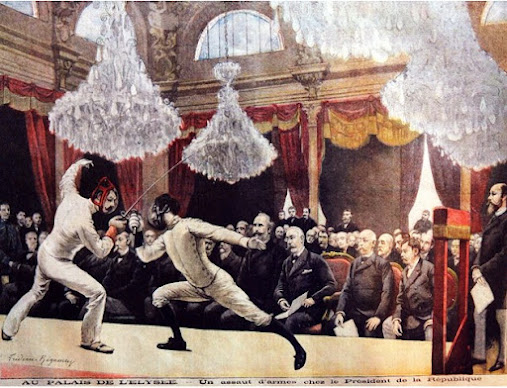Behind the Story – Azarbad the Aeronaut and Richard Francis Burton
“Burton for the Sewers”
A Bawdy and Uncensored Translation of the Arabian Nights is covertly published, and I learn what “futtering” means.
THE BOOK OF THE THOUSAND NIGHTS AND A NIGHT
A Plain and Literal Translation of the Arabian Nights Entertainments
Translated and Annotated by Richard F. Burton 1885
 |
| Title Page for the Thousand Nights and a Night 1885 |
So, being afraid, they came down to her, and she rose before them and said, "Stroke me a strong stroke, without stay or delay, otherwise will I arouse and set upon you this Ifrit, who shall slay you straightway." They said to her: "O our lady, we conjure thee by Allah, let us off this work, for we are fugitives from such, and in extreme dread and terror of this thy husband. How then can we do it in such a way as thou desirest?" "Leave this talk. It needs must be so," quoth she, and she swore them by Him who raised the skies on high without prop or pillar that if they worked not her will, she would cause them to be slain and cast into the sea. Whereupon out of fear King Shahryar said to King Shah Zaman, "O my brother, do thou what she biddeth thee do." But he replied, "I will not do it till thou do it before I do." And they began disputing about futtering her.
Then quoth she to the twain: "How is it I see you disputing and demurring? If ye do not come forward like men and do the deed of kind, ye two, I will arouse upon you the Ifrit." At this, by reason of their sore dread of the Jinni, both did by her what she bade them do, and when they had dismounted from her, she said, "Well done!" She then took from her pocket a purse and drew out a knotted string whereon were strung five hundred and seventy seal rings, and asked, "Know ye what be these?" They answered her saying, "We know not!" Then quoth she: "These be the signets of five hundred and seventy men who have all futtered me upon the horns of this foul, this foolish, this filthy Ifrit. So give me also your two seal rings, ye pair of brothers."
 |
| Jinni Wife Seduces the Brother Kings - by Albert Letchford |
From the “STORY OF KING SHAHRYAR AND HIS BROTHER”, Volume 1 of The Book of the Thousand Nights and a Night by Richard Francis Burton
Introduction
The Thousand and One Nights, commonly referred to as the Arabian Nights, has been translated and retold many times. Few have such length and detail as the publication spanning 1885-1888 by Sir Richard Francis Burton. When completed, the Book of a Thousand Nights and a Night encompassed 10 volumes and 6 supplemental volumes, actually covering a thousand and one nights (with several stories taking many nights to tell).
When writing “Azarbad the Aeronaut”, I relied on Burton’s version as my source. I enjoy his translation (though it has many detractors), and find the Victorian adventurer a fascinating character.
Captain Richard Francis Burton
Illustration of Burton for the Arabian Nights by Albert Letchford
Burton also flaunted Victorian norms, more at home when he was away from England, and with a reputation for sensationalism and tactlessness. This contributed to his lack of advancement within the British bureaucracy. After his explorations in Africa and pilgrimage to Mecca and Medina, Burton found himself with low level government jobs as a British Consul stationed in out of the way places such as Fernando Po (an island off the west coast of Africa) and Santos in Brazil.
His final post was in Trieste, a seaport in northeast Italy. An out-of-the-way place with mild temperatures in the summer, Trieste can attain sub-zero weather in the winter due to bora winds off the Adriatic Sea. This was another attempt by the government to move Burton to an undesirable and minor assignment. While Burton continued to lobby for a spot in Morocco, the post in Trieste did give him time to finish his translation of the Arabian Nights.
Labor of Love
For Burton, the book was a labor of love. He says of writing the Nights:
 |
| Punch Cartoon of Richard Burton in Eastern Dress by Edward Linley Sambourne 1882 |
“During my long years of official exile to the luxuriant and deadly deserts of Africa, Eastern and Western, and to the dull and dreary half-clearings of South America, it proved itself a talisman against ennui and despondency.”
Sources and Translations
Burton’s was not the first English translation. The stories themselves were compiled during the Islamic Golden Age of the 8th to 13th centuries from mainly Indian, Arabic and Persian tales.
The Frenchman Antoine Galland is credited with first bringing the Nights to western readers in 1717. English translations included Jonathan Scott in 1811 and Edward Lane in 1840. A contemporary of Burton named John Payne published a 9 volume translation in 1882. Burton collaborated with Payne for his edition. Burton’s translation was based on several manuscripts and texts, for which he made the first complete translation of the Macnaghten or Calcutta II edition (Egyptian recension) of the Arabian Nights.
So, what made this translation of a popular book controversial, forcing Burton to publish it anonymously and fear arrest?
A Full and Complete Translation
Burton said that the idea for Nights came after his pilgrimage to Mecca and Medina on a visit in 1852 with his friend John Frederick Steinhauser. They agreed that the Nights had been diluted as tales for children, and decided to “produce a full, complete, unvarnished, uncastrated copy of the great original.”
He would not edit out the social and sexual content that previous translators considered offensive, and write the text “as the Arab would have written in English”. Burton had a fascination with sexual customs, and often wrote about them in the various lands he visited.
Yet he insisted that his translation was in no way immoral, that such text was common outside of stuffy old England, and that even western literature had its share of lewdness.
He refers to the turpiloquium or immodest speech, and compares the modest prose of English literature to the writing of the Eastern story-teller:
“For instance, the European novelist marries off his hero and heroine and leaves them to consummate marriage in privacy; even Tom Jones has the decency to bolt the door. But the Eastern story-teller, especially this unknown “prose Shakespeare,” must usher you, with a flourish, into the bridal chamber and narrate to you, with infinite gusto, everything he sees and hears. Again we must remember that grossness and indecency, in fact les turpitudes, are matters of time and place; what is offensive in England is not so in Egypt; what scandalises us now would have been a tame joke tempore Elisa. Withal The Nights will not be found in this matter coarser than many passages of Shakespeare, Sterne, and Swift.”
And again, in the biography of Burton written by his wife Isabel, he is quoted as saying:
“I have not only preserved the spirit of the original, but the mécanique. I don't care a button about being prosecuted, and if the matter comes to a fight, I will walk into court with my Bible and my Shakespeare and my Rabelais under my arm, and prove to them that before they condemn me, they must cut half of them out, and not allow them to be circulated to the public.”
It was not just his translation that was salacious. Burton emphasized his book as anthropological and scientific, and so inserted volumes of notes (as Burton is want to do) that included the social and sexual customs of Islamic culture appearing in the Nights.
The Terminal Essay
Finally, there is the Terminal Essay included in Volume 10, in which Burton deals at great length not only with the origin and history of the Nights and matters erotic, but also with a lengthy discourse on pederasty. Burton approaches all this erotic material in a scientific manner, and while he certainly intended to shock his conservative British audience, he also believed that the Victorian view of sex was priggish and discriminatory. Burton differed from Victorian morals in that he believed women’s passions equaled that of men.
Education on the Moslem World
Burton’s other stated intention was to educate the west on the Arab world through the Nights. Much of the Arab world was under British rule during Burton’s time. Egypt had just fell under British rule in 1882.
As Burton states:
“England is ever forgetting that she is at present the greatest Mohammedan empire in the world.”
And that:
“with the aid of my annotations supplementing Lane's, the student will readily and pleasantly learn more of the Moslem's manners and customs, laws and religion than is known to the average Orientalist; and, if my labours induce him to attack the text of The Nights he will become master of much more Arabic than the ordinary Arab owns.”
The Kama Shastra Society
To publish such a sensational work in Britain, he had to circumvent the Obscene Publications Act of 1857. This legislation outlawed the sale of obscene material and empowered police to conduct searches on premises suspected of harboring pornographic publications.
Burton’s workaround was the Kama Shastra Society of London and Benares, a purely fictional publishing house created by Burton and his friends F.F. Arbuthnot (another British orientalist and translator) and Richard Monckton Milnes. It had a fake headquarters in Cosmopli, Greece.
Burton had already published translations of other eastern texts of a sexual nature such as the Kama Sutra of Vatsyayana, the Perfumed Garden of Cheikh Nefzaoui, and the Ananga Ranga.
They then offered the volumes by paid subscription through the mail to private subscribers.
Critical Reception
Burton’s Arabian Nights was considered pornography by many critics. Stanley Lane-Poole was an Orientalist and archeologist, as well as a contributor to the Edinburg Review. In 1886 he wrote an article on various translations of the Arabian Nights and said of Burton’s version:
“Probably no European, even if he have live half a century ‘in Orient lands’, has ever gathered together such an appalling collection of degrading customs and statistics of vice as is contained in the notes to Captain Burton’s translation of the ‘Arabian Nights’.”
Lane-Poole concludes that:
“The different versions, however, have each its proper destination – Galland for the nursery, Lane for the library, Payne for the study, and Burton for the sewers.”
Financial Success
Despite such disapproval, the translation was an outstanding commercial and critical success, and finally brought Burton some financial security. He did not have much time to enjoy the success, he died in Trieste only a few years later in 1890. Modern scholars are critical of his translation, but Burton did accomplish his goal to infiltrate the prudish norms of Victorian society.
Look for “Azarbad the Aeronaut” in the anthology edited by Phoebe Darqueling called Fairy Tales Punk’d, available at Amazon and other booksellers.
Oh, and if you haven't figutred out what futtering means, it's kind of what it sounds like...






Comments
Post a Comment